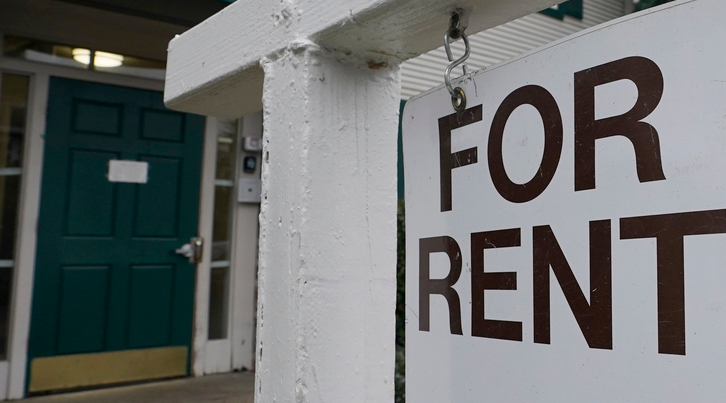Windsor city council approves residential rental licensing bylaw
 FILE IMAGE (AP Photo/Rich Pedroncelli)
FILE IMAGE (AP Photo/Rich Pedroncelli)
The City of Windsor is hoping to make rental housing in the city’s western wards safer with a new residential rental bylaw scheme.
Council passed the bylaw for wards 1 and 2 Monday night as a two-year pilot project, which is designed to raise property standards and ensure property owners are compliant with the city’s building and fire codes.
These wards are home to The University of Windsor and St. Clair College, which is where the majority of student renters reside.
“Our goal is not at any point to stop landlords from renting or to put people out, we want people to have safe housing and that is the purpose,” said City lawyer Shelby Askin-Hager.
When the pilot project goes into place in an estimated six months, rental housing owners will need to have their units inspected and licensed.
“The pilot, as it’s being proposed, it’s surgical. I think it’s going to narrow in on some of the trouble-makers, the landlords that aren’t playing by the rules,” says Ward 2 coun. Fabio Costante, who says the long-standing issue is one of the reasons he ran for office in the first place. “The hope is over time, the standard of housing stock in our community is elevated and conforms to just the minimum standards under the building code and fire code.”
Landlords will have to pay a per-dwelling unit annual licensing fee of approximately $466 in year one, and $275 in year two.
A handful of property owners appeared as delegates during Monday’s meeting, speaking out against the bylaw. They argue the licensing fees punish good landlords and tenants, because the added fees will ultimately be passed onto renters, raising rents in an already expensive market.
“I can’t speak to the very very very small percentage of landlords who are not following the code, but this licensing bureaucracy is pretty well going to make all the landlords, even the good ones, and there is a vast majority, to pay a fee, pass it along,” says real estate agent Al Teshuba.
“The road to misery, my friends, is often paved with good intentions,” says John Seeman, a local property owner. “This bylaw is unbelievable, some of the things that it’s requiring… Why don’t we use this money as landlords to actually solve some of the problems?”
But councilors who voted in favour hope the pilot will allow the city to collect data and determine if the pilot should continue or potentially go city-wide after the pilot project wraps up.
“One of the big reasons why we cautiously moved forward with this measured approach to institute a pilot is to track this information, gather the data and determine if in fact it’s true that rents are increasing and what’s the shake up of this implementation,” says Costante.
CTVNews.ca Top Stories

Bird flu, measles top 2025 concerns for Canada's chief public health officer
As we enter 2025, Dr. Theresa Tam has her eye on H5N1 bird flu, an emerging virus that had its first human case in Canada this year.
DEVELOPING Body found in wheel well of plane at Maui airport
A person was found dead in the wheel well of a United Airlines flight to Maui on Tuesday.
Ottawa police identify victim of Christmas Day homicide in Hintonburg, charge suspect
The Ottawa Police Service says the victim who has been killed on Christmas Day in Hintonburg has been identified.
Christmas shooting at Phoenix airport leaves 3 people wounded
Police are investigating a Christmas shooting at Sky Harbor Airport in Phoenix that left three people injured by gunfire.
Your kid is spending too much time on their phone. Here's what to do about it
Wondering what your teen is up to when you're not around? They are likely on YouTube, TikTok, Instagram or Snapchat, according to a new report.
Bird flu kills more than half the big cats at a Washington sanctuary
Bird flu has been on the rise in Washington state and one sanctuary was hit hard: 20 big cats – more than half of the facility’s population – died over the course of weeks.
Swimmer Summer McIntosh voted The Canadian Press female athlete of the year for 2024
During the month before her 18th birthday, Summer McIntosh became the first Canadian to win three gold medals in a single Olympic Games, winter or summer, with a silver medal thrown in for good measure.
6,000 inmates stage Christmas Day escape from high-security Mozambique prison
At least 6,000 inmates escaped from a high-security prison in Mozambique's capital on Christmas Day after a rebellion, the country's police chief said, as widespread post-election riots and violence continue to engulf the country.
Plush toys recalled due to choking hazard
Health Canada announced a recall on a series of plush toys due to a choking hazard. Anyone who has purchased an elephant, giraffe, lion, tiger and/or panda plush toy with an attached baby can return them to the place of purchase for a refund.

































